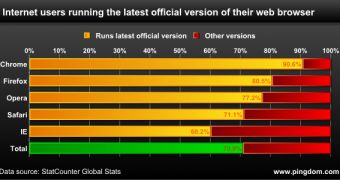There are several good reasons why you should always be running the latest stable version of which every browser you prefer. Not only are you making the life of webmasters and web developers everywhere easier, you're also better protected against any number of threats on the web.
Unfortunately, updating their browser is not exactly on top of priorities for most people. The number of people still using Internet Explorer 6 is a testament to that, though, IE6 may not be the greatest example as many users may simply not have a choice.
So, an obvious question is, just how up to date are most people browsing the web. Using data from StatCounter, Pingdom argues that the figure is actually quite encouraging, 71 percent of internet users are running the latest version of their browser.
Google Chrome users fare the best and Internet Explorer users the worst, but, overall, it seems like most people are quite up to date.
Here's the rundown:
- 91 percent of Chrome users run version 7.0; - 81 percent of Firefox users run version 3.6; - 77 percent of Opera users run version 10.6; - 71 percent of Safari users run version 5.0; - 60 percent of Internet Explorer users run version 8.0; - 71 percent of users are running the latest official major version of their browser, overall.
Runing the lastest major version doesn't mean you're safe
There are a few caveats though and they have to do with the way browser makers number their products and their release schedule.
For example, the latest official major version of Internet Explorer is IE 8. However, IE 8 was released about a year and a half ago and comes bundled (in most regions) with Windows 7. There have been a large number of updates and patches to IE 8 since then, but the version number has stayed the same.
The same is true for Mozilla users. Firefox 3.6 was released early this year, but there have been 12 updates since. In Pingdom's study, there is no way to know which of the minor versions users are running.
From a features and web technologies and standards point of view, the minor versions don't really make a difference, any minor version of IE 8 is pretty much identical as is any version of Firefox 3.6.
From a security point of view though, minor versions make a huge difference. Even though users are technically running the latest version, they may still be awfully out of date and exposed to any number of threats.
There is another caveat, the comparison is not exactly apples to apples. While Microsoft may take two years to release a new version of its browser and Mozilla several months to a year, a 'major' version of Google Chrome is now coming once every six weeks.
Normally, this would mean that Chrome should be faring the worst, but the Google browser has a secret weapon, automatic updates. With Chrome, new versions are downloaded and installed in the background so most users will always be running the very latest release.
One final caveat is that, even though users may not be running the latest major stable release, it doesn't mean that they are running out-of-date versions. Many may be using beta or dev channel releases of Google Chrome, or the Firefox 4 beta or IE 9 beta.

 14 DAY TRIAL //
14 DAY TRIAL //